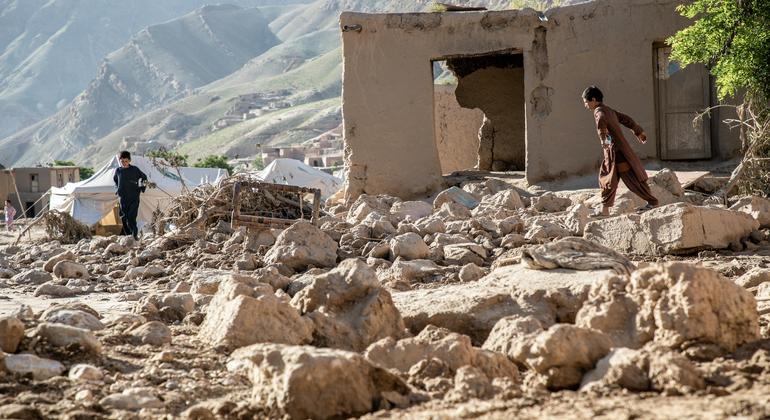Officials highlight severe poverty, humanitarian desperation in Afghanistan

Top officials of the United Nations Support Mission in Afghanistan (UNAMA) and the United Nations Office for the Coordination of Humanitarian Affairs (OCHA) briefed ambassadors to the 15-member Council, describing the impact on civilians since the Taliban takeover in August 2021.
Roza Otunbayeva, Special Representative of the Secretary-General for Afghanistan and Head of UNAMA emphasize “massive poverty” nationwide.
“Afghanistan remains beset by severe poverty that makes people even more vulnerable to many of the natural disasters we have seen in the past few years due to climate change,” she said.
This is despite more than $7 billion in international support for humanitarian assistance and more than $4 billion in civilian assistance since the de facto government took power.
Brain drain
Furthermore, female Afghan civil servants were told they could not return to work until the “necessary conditions” were approved by the Taliban, which is now subject to severe pay cuts.

Special Representative Otunbayeva briefed the Security Council.
This raises concerns about not being able to pay rent or support family.
“These Restrictions deprive the country of important human resources that they need to implement the Taliban’s own self-reliance policy,” Ms. Otunbayeva said.
“They contribute to a brain drain that undermines Afghanistan’s future.”
Impact on women and girls
Lisa Doughten, Director of Finance and Partnerships at OCHA, echoed the concerns situation of women and girls.
“Afghanistan will soon enter its fourth year of de facto Taliban government,” she said, adding: “No one feels the impact more deeply than women and girls.”
Furthermore, the government de facto restricted girls from attending school after the 6th grade – a policy that had been in place for more than 1,000 days.
Ms. Doughten said the ban has increased child marriage and early childbirth.
It also increases levels of depression and reports of suicide attempts in women and girls.
Climate change worries
Ms. Doughten also emphasized that the impacts of climate change, including extreme weather and more frequent and severe droughts, have compounded the crisis.

Director Doughten briefs the Security Council.
About 120,000 people were affected Flash floods and landslides in some areas of the country. Hundreds of people died, villages were destroyed and tens of thousands of acres of farmland were devastated.
“Afghanistan remains completely unprepared to deal with these increasingly persistent threats and will require significant investment in early warning and early response systems,” Ms. Doughten said.
She called for more long-term solutions to help Afghans overcome poverty and adapt to climate impacts.
“Nothing is easy in Afghanistanbut with sustained support, we can assist people in realizing a life of peace, stability and hope.”
A hope moving forward
On June 30, the United Nations will hold a meeting in Qatar’s capital Doha to discuss the issue. continue discussion about the situation in Afghanistan.
Special Representative Otunbayeva expressed hope that key stakeholders at the meeting would come to a consensus on what could be done to “reduce the uncertainties” facing the Afghan people.
This will only happen if there is greater flexibility among stakeholders and “a clearer political willingness on the part of all parties to go beyond crisis management to address the issues,” she concluded. bigger problem in Afghanistan and among Afghans as well as between Afghanistan and the international community.”


